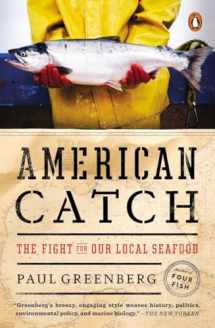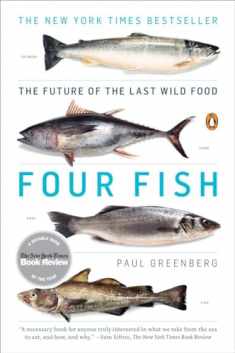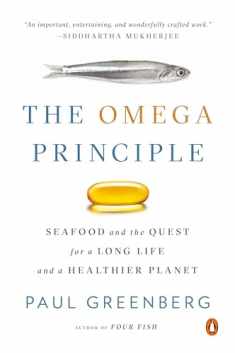
American Catch: The Fight for Our Local Seafood
ISBN-13:
9780143127437
ISBN-10:
0143127438
Edition:
Reprint
Author:
Paul Greenberg
Publication date:
2015
Publisher:
Penguin Books
Format:
Paperback
320 pages
Category:
Fish & Seafood
,
Cooking by Ingredient
,
Camping & RVs
,
Outdoor Cooking
,
Engineering
,
Food Science
,
Agricultural Sciences
FREE US shipping
on ALL non-marketplace orders
Marketplace
from $11.56
USD
Marketplace offers
Seller
Condition
Note
Seller
Condition
Used - Very Good
US Soft Cover Edition. Book is in great condition! Little to no damage present on cover, pages, spine, or corners. An amazing buy!
Book details
ISBN-13:
9780143127437
ISBN-10:
0143127438
Edition:
Reprint
Author:
Paul Greenberg
Publication date:
2015
Publisher:
Penguin Books
Format:
Paperback
320 pages
Category:
Fish & Seafood
,
Cooking by Ingredient
,
Camping & RVs
,
Outdoor Cooking
,
Engineering
,
Food Science
,
Agricultural Sciences
Summary
American Catch: The Fight for Our Local Seafood (ISBN-13: 9780143127437 and ISBN-10: 0143127438), written by authors
Paul Greenberg, was published by Penguin Books in 2015.
With an overall rating of 3.9 stars, it's a notable title among other
Fish & Seafood
(Cooking by Ingredient, Camping & RVs, Outdoor Cooking, Engineering, Food Science, Agricultural Sciences) books. You can easily purchase or rent American Catch: The Fight for Our Local Seafood (Paperback) from BooksRun,
along with many other new and used
Fish & Seafood
books
and textbooks.
And, if you're looking to sell your copy, our current buyback offer is $0.36.
Description
INVESTIGATIVE REPORTERS & EDITORS Book Award, Finalist 2014
"A fascinating discussion of a multifaceted issue and a passionate call to action" --Kirkus
From the acclaimed author of Four Fish and The Omega Principle, Paul Greenberg uncovers the tragic unraveling of the nation’s seafood supply—telling the surprising story of why Americans stopped eating from their own waters in American Catch
In 2005, the United States imported five billion pounds of seafood, nearly double what we imported twenty years earlier. Bizarrely, during that same period, our seafood exports quadrupled. American Catch examines New York oysters, Gulf shrimp, and Alaskan salmon to reveal how it came to be that 91 percent of the seafood Americans eat is foreign.
In the 1920s, the average New Yorker ate six hundred local oysters a year. Today, the only edible oysters lie outside city limits. Following the trail of environmental desecration, Greenberg comes to view the New York City oyster as a reminder of what is lost when local waters are not valued as a food source.
Farther south, a different catastrophe threatens another seafood-rich environment. When Greenberg visits the Gulf of Mexico, he arrives expecting to learn of the Deepwater Horizon oil spill’s lingering effects on shrimpers, but instead finds that the more immediate threat to business comes from overseas. Asian-farmed shrimp—cheap, abundant, and a perfect vehicle for the frying and sauces Americans love—have flooded the American market.
Finally, Greenberg visits Bristol Bay, Alaska, home to the biggest wild sockeye salmon run left in the world. A pristine, productive fishery, Bristol Bay is now at great risk: The proposed Pebble Mine project could under¬mine the very spawning grounds that make this great run possible. In his search to discover why this pre¬cious renewable resource isn’t better protected, Green¬berg encounters a shocking truth: the great majority of Alaskan salmon is sent out of the country, much of it to Asia. Sockeye salmon is one of the most nutritionally dense animal proteins on the planet, yet Americans are shipping it abroad.
Despite the challenges, hope abounds. In New York, Greenberg connects an oyster restoration project with a vision for how the bivalves might save the city from rising tides. In the Gulf, shrimpers band together to offer local catch direct to consumers. And in Bristol Bay, fishermen, environmentalists, and local Alaskans gather to roadblock Pebble Mine. With American Catch, Paul Greenberg proposes a way to break the current destructive patterns of consumption and return American catch back to American eaters.
"A fascinating discussion of a multifaceted issue and a passionate call to action" --Kirkus
From the acclaimed author of Four Fish and The Omega Principle, Paul Greenberg uncovers the tragic unraveling of the nation’s seafood supply—telling the surprising story of why Americans stopped eating from their own waters in American Catch
In 2005, the United States imported five billion pounds of seafood, nearly double what we imported twenty years earlier. Bizarrely, during that same period, our seafood exports quadrupled. American Catch examines New York oysters, Gulf shrimp, and Alaskan salmon to reveal how it came to be that 91 percent of the seafood Americans eat is foreign.
In the 1920s, the average New Yorker ate six hundred local oysters a year. Today, the only edible oysters lie outside city limits. Following the trail of environmental desecration, Greenberg comes to view the New York City oyster as a reminder of what is lost when local waters are not valued as a food source.
Farther south, a different catastrophe threatens another seafood-rich environment. When Greenberg visits the Gulf of Mexico, he arrives expecting to learn of the Deepwater Horizon oil spill’s lingering effects on shrimpers, but instead finds that the more immediate threat to business comes from overseas. Asian-farmed shrimp—cheap, abundant, and a perfect vehicle for the frying and sauces Americans love—have flooded the American market.
Finally, Greenberg visits Bristol Bay, Alaska, home to the biggest wild sockeye salmon run left in the world. A pristine, productive fishery, Bristol Bay is now at great risk: The proposed Pebble Mine project could under¬mine the very spawning grounds that make this great run possible. In his search to discover why this pre¬cious renewable resource isn’t better protected, Green¬berg encounters a shocking truth: the great majority of Alaskan salmon is sent out of the country, much of it to Asia. Sockeye salmon is one of the most nutritionally dense animal proteins on the planet, yet Americans are shipping it abroad.
Despite the challenges, hope abounds. In New York, Greenberg connects an oyster restoration project with a vision for how the bivalves might save the city from rising tides. In the Gulf, shrimpers band together to offer local catch direct to consumers. And in Bristol Bay, fishermen, environmentalists, and local Alaskans gather to roadblock Pebble Mine. With American Catch, Paul Greenberg proposes a way to break the current destructive patterns of consumption and return American catch back to American eaters.


We would LOVE it if you could help us and other readers by reviewing the book
Book review

Congratulations! We have received your book review.
{user}
{createdAt}
by {truncated_author}




